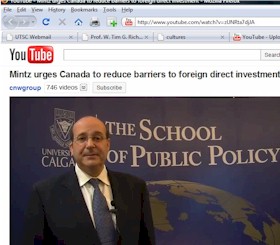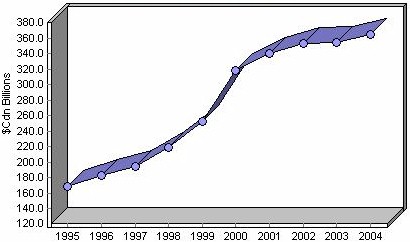Foreign Direct Investment in to Canada
- see also special section on Japanese FDI in Canada www.witiger.com/internationalbusiness/JPNFDI.htm .

| FDI
in to Canada
Foreign Direct Investment in to Canada - see also special section on Japanese FDI in Canada www.witiger.com/internationalbusiness/JPNFDI.htm . |
 |
|
INTRODUCTION |
The ability
to attract Foreign Direct Investment is a validation of international opinion
on the attractiveness of an economy. If you cannot successfully attract
FDI then it is bad because you will miss out on developments in the technological
environment and you will suffer in a competitive economic environment.
The Dept. of Foreign Affairs exist mostly to help Canadian companies export, Industry Canada has sub-departments that work on attracting investment in to Canada. Provincial governments and large municipalities also work at attracting foreign investment into their territory because of the belief that the investment will increase job opportunities and increase the corporate tax base. WTGR |
 |
student Tushar C. in MGTC46
in Feb 2011 found this YouTube video in which Prof. Mintz of the University
of Calgary
www.ucalgary.ca/innovators/mintz youtube.com/watch?v=zUNRta7djJA discusses points about foreign direct investment in to Canada. Mintz argues that Canada is not in danger of being bought out by too many large foreign companies and makes a point that Canada is in turn doing a lot of the FDI overseas. |
http://www.conferenceboard.ca/HCP/Details/Economy/Outward-fdi-performance.aspx
http://www.conferenceboard.ca/hcp/details/economy/inward-fdi-performance.aspx
these links from the Conference
Board were found by student Florian L. in MGTC46 in Feb 2010
- the material is dated
2009 and covers stats up to 2008
Foreign Direct Investment in Canada 1995 - 2004
| As boasted by
the Ont. Gov't website www.2ontario.com
"Canada puts no restrictions on the repatriation of capital or profit by foreign investors - one of the reasons the country attracts a high level of foreign investment." This chart was compiled from
Stats Canada
|
 |
| federal
politics |
Anderson reported
|
| outgoing
FDI
vs. incoming FDI |
2006
outgoing FDI vs. incoming FDI
which simply means that Canadian businesses have been spending more money investing abroad compared to other businesses around the world investing in Canada |
|
F.D.I. withdrawn
|
U.S. auto
parts maker shuts down plant in Canada
500 Canadian autoworkers lose jobs to Mexico - the story line in Sept 2007 when the newspaper described how U.S. auto-parts maker ArvinMeritor Inc. arvinmeritor.com was shutting down a 500 employee Toronto plant and shifting the work to Mexico. One of the reasons why Canadians want to ATTRACT FDI is to attract the jobs that are associated with such investments - and when the investment turns out to be too expensive to continue, the foreign company may withdraw, and many Canadians will be left unemployed. ArvinMeritor, which makes shock absorbers, said on their website "The company must operate from a global manufacturing footprint that optimizes capacity and reduces costs" Employee cuts by auto parts makers follows trends in te economic environment in North America which has seen the BIG 3 auto makers cut tens of thousands of jobs in recent years to deal with falling sales and the consequence of consumers shift to Asian cars. WTGR |
|
Hudson's Bay - bought out by foreigners |
http://www.pbs.org/empireofthebay/ My grandfather and great-grandfather
shopped at the Hudson Bay Stores in Manitoba in the 1800's. "...at one
point the Hudson's Bay Company owned most of Canada, and it was only after
Confederation in 1867 that negotiations were undertaken with the goal of
transferring ownership of lands west of Kenora, Ont., to the government
of Canada."
In January 2006, American billionaire Jerry Zucker finally put together a large enough offer that the Bay's board of directors agreed to sell the company. This is somewhat sad since many of the other large Canadian companies like Eatons and the Canadian Pacific Railway hotels are also sold off foreigners. In the 4th week of January 2006 the story of the Bay being sold got a lot of press in the newspapers. Why would an American want the Bay? Well, it has 100 Bay department stores and 290 Zellers discount all in prime areas of real estate in all the large and medium sized Canadian cities - that in itself is quite valuable. Some people think this situation of foreign FDI in Canada is bad for Canada and they note that Dominion Bond Rating Service, which kept HBC "under review with negative implications," reiterating concern that Zucker, who is paying $1.06 billion to buy the company might gut the retailer of its real-estate assets which have an estimated value of between $700 million and $900 million. WTGR |
|
Hudson's Bay last
|
Mark Anderson
wrote in The Ottawa Citizen "..one of HBC's last -- and many observers
felt best -- moves as a Canadian company was to spend $100 million to wrest
the Olympic clothing contract away from Roots Canada, whose distinctive
team beret was the fashion hit of the 1988 winter games in Nagano, Japan.
Indeed, so popular was the Roots uniform that several other countries contracted
the Canadian company to make their uniforms for next month's Winter Olympics.
The result is that Canadian athletes will parade into Turin wearing clothes
by American-owned HBC, while U.S. Olympians will sport outfits designed
by Canada's Roots."
WTGR |
|
Hudson's Bay |
Many Canadians
of Scotch-Irish and French heritage are familiar with this historic company
and many know the letters on the company sign that proclaim the founding
in 1670.
Some marketing experts think that new Canadians from Asia and the Caribbean would think of HBC as just another dept. store - only more expensive than Wal-Mart. Hudson's Bay suffered the consequences of a very very intense competitive market and the "fame" of its brand has not (in the 1990's and early years of Y2K) been powerful enough to capture new customers from a population in the large cities who shop based on low price. WTGR |
|
Canadian Pacific Hotels Fairmont
|
|
|
Alcan Alcoa |
May 2007 ALCOA in the U.S. launched a $27 billion hostile bid for Alcan Canada Alcan's website said May
7th (2007)
the Financial Post said May
9th
posted by Jonathan Ratner
|
| International
opinion of Canada's attractiveness as an FDI destination
International opinion of
Canada's attractiveness as an FDI destination
|
If you check the www.atkearney.com site you can read parts of the report titled "Foreign Direct Investment Confidence Index, September 2003" The Press Release section
on the www.atkearney.com
site says
|
The
Three Gorges Project in China
the
new Chek Lap Kok airport in Hong Kong
the
2,400 mile MacKenzie Valley gas pipeline
the
Chunnel from England to France
however
in terms of the amount of real estate involved and distance covered, nothing
could compared to the CPR which
.
|
|
CONTACTIMAIN PAGE I NEWS GALLERY IE-BIZ SHORTCUTS I INT'L BIZ SHORTCUTS IMKTG&BUSINESS I TEACHING SCHEDULE IMISTAKES ITEXTS USED IIMAGESIRANKI |
| . |